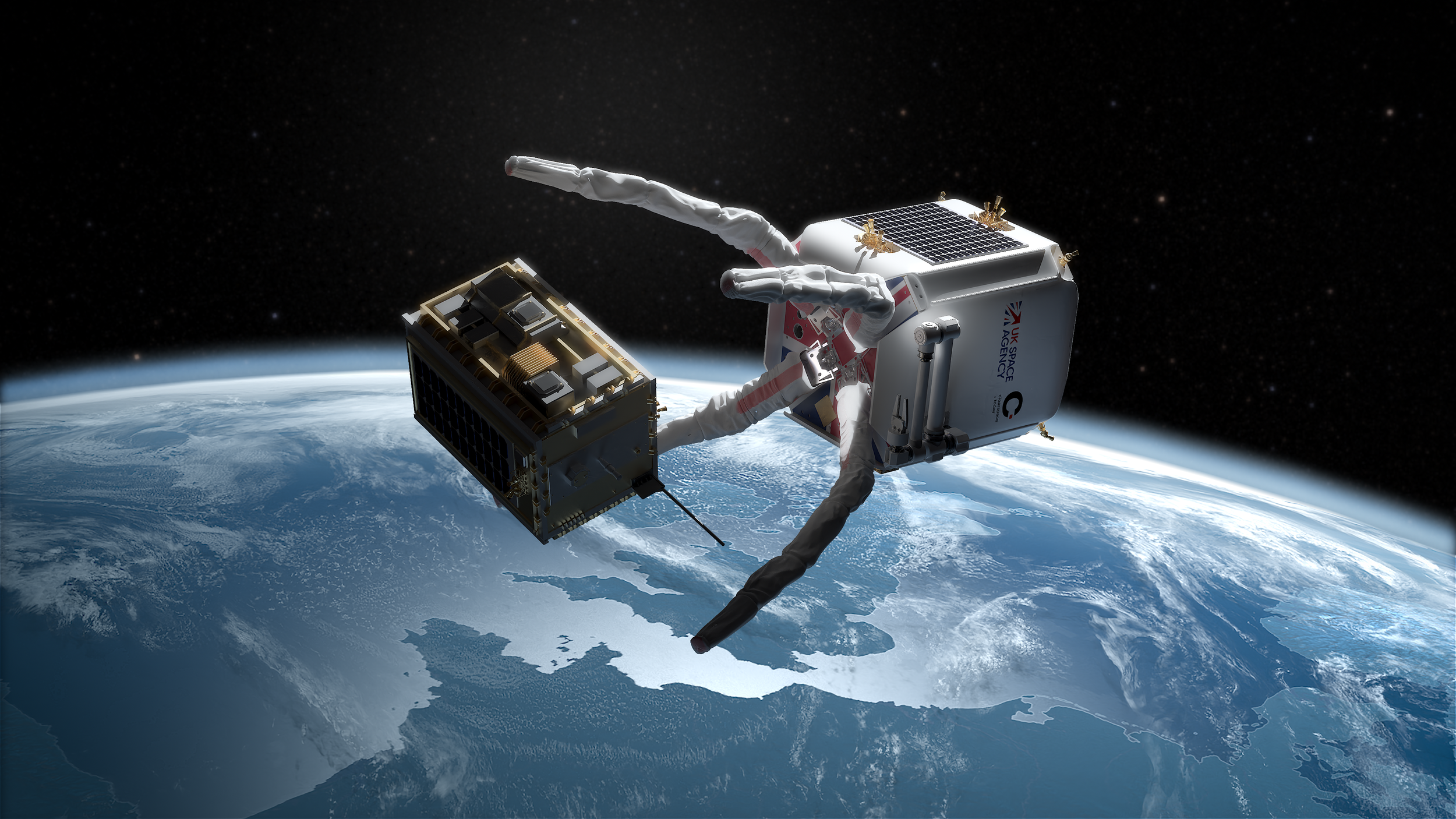ClearSpace secures a major UK contract to help clean up space
Artistic impression of the CLEAR servicer capturing a derelict satellite © ClearSpace
Following the successful completion of a feasibility study of the CLEAR mission to remove two UK-registered derelict objects from low Earth orbit, a consortium led by ClearSpace has been awarded a follow-up contract by the UK Space Agency to perform the preliminary design of the mission. The company’s solution responds to the pressing need to preserve the increasingly congested space environment and is a stepping stone towards other services in orbit.
In October 2021, the UK Space Agency (UKSA) commissioned the ClearSpace UK-based subsidiary to perform a feasibility study for a mission to remove at least two UK-registered derelict objects from low Earth orbit (LEO). In this study, the team explored different mission scenarios, defined the mission and system requirements and selected the technologies necessary for the implementation of the mission. In March 2022, ClearSpace and its partners successfully completed this first study phase.
ClearSpace has now been awarded a £2.2M contract by the UKSA to conduct the next phase of this mission. This design phase will last until October 2023 and will finish with the preliminary design review — an evaluation of the progress on the design and the technical adequacy of the proposed mission. The Clearing of the LEO Environment with Active Removal (CLEAR) mission, which will advance key technology building blocks, is a catalyst for the development of commercially viable disposal services.
Rory Holmes, ClearSpace UK Managing Director said: “ClearSpace is honoured to work with the UK Space Agency to improve the safety and sustainability of our orbital neighbourhoods. We are excited to work with cutting-edge UK-based space companies – Alden Legal, AstroAgency, Critical Software, Deimos, MDA, Orbit Fab, Satellite Applications Catapult, University of Surrey’s STAR LAB – to make space debris removal a reality. The continuation of the CLEAR mission allows us to continue to develop state-of-the-art space technologies, such as complex robotics and AI-based algorithms, within the UK.”
The UK Space Agency is enabling UK companies to obtain the first-mover advantage in the emerging in-orbit services (IOS) market, which is forecast to reach $14.3 B in cumulative revenue by 2031. Debris removal is expected to be the fastest growing segment of IOS, due to the increased need for operators to protect spacecraft in increasingly congested orbits. The UK also announced in June its Plan for Space Sustainability to demonstrate the UK leadership in sustainable space, through the establishment of a new Space Sustainability Standard and a review of the regulatory framework. The second phase contract awarded to ClearSpace is a concrete step towards safe and sustainable space highlighting the UK’s commitment to this important area.
Dr Paul Bate, Chief Executive of the UK Space Agency, said: “As our reliance on space technologies increases rapidly and the UK becomes a global hub of satellite design, manufacturing and launch, we are committed to leading efforts to make space more sustainable. With 1,700 satellites launched last year alone, the need to safeguard the space environment for the benefit of everyone on Earth has never been more pressing.
By catalysing investment, backing innovative new technologies and supporting a national mission to remove space debris, we can keep space open for future generations and protect the important satellite services that modern life depends on.”
The CLEAR mission will remove two derelict UK objects which have been inactive for more than 10 years. These objects are predicted stay in orbit for a century before they naturally re-enter the atmosphere and are located in a very congested region of LEO, above 700 km altitude, endangering the space environment and the safety of space operations. By removing them, the UK is sending a strong message to the world regarding its commitment to address the space debris issue and lead by example in reducing orbital congestion. This is crucial to protect critical space-based infrastructure that underpins a wide array of human activities, such as transport systems, climate change monitoring, financial transactions and weather forecasting.
By leveraging existing developments performed for other active debris removal (ADR) missions, ClearSpace brings significant expertise in this area, including capture system robotics, low-cost sensor technologies, and navigation techniques and algorithms. The ClearSpace-led consortium consists of nine diverse entities from across the UK. This flagship mission is set to enhance the depth and breadth of the space ecosystem in the UK and combine technical innovations from overseas with home-grown excellence. This project alone is expected to create more than seventy new direct jobs in the UK, as well as supporting indirect employment and supply chain opportunities.
